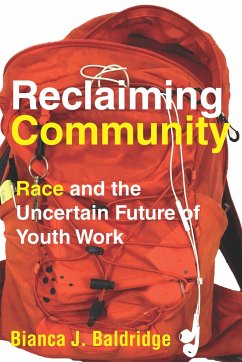- Gebundenes Buch
- Merkliste
- Auf die Merkliste
- Bewerten Bewerten
- Teilen
- Produkt teilen
- Produkterinnerung
- Produkterinnerung
Bianca J. Baldridge is Assistant Professor in the Department of Educational Policy Studies at the University of Wisconsin-Madison.
Andere Kunden interessierten sich auch für
![Resisting Asian American Invisibility Resisting Asian American Invisibility]() Stacey J LeeResisting Asian American Invisibility125,99 €
Stacey J LeeResisting Asian American Invisibility125,99 €![Black Privilege Black Privilege]() Cassi Pittman ClaytorBlack Privilege132,99 €
Cassi Pittman ClaytorBlack Privilege132,99 €![Getting Ghost Getting Ghost]() Luke BergmannGetting Ghost25,99 €
Luke BergmannGetting Ghost25,99 €![The Caribbeanization of Black Politics The Caribbeanization of Black Politics]() Sharon D Wright AustinThe Caribbeanization of Black Politics113,99 €
Sharon D Wright AustinThe Caribbeanization of Black Politics113,99 €![How Racism Takes Place How Racism Takes Place]() George LipsitzHow Racism Takes Place90,99 €
George LipsitzHow Racism Takes Place90,99 €![Harlemworld Harlemworld]() John L Jackson JrHarlemworld41,99 €
John L Jackson JrHarlemworld41,99 €![A Place We Call Home A Place We Call Home]() K Amimahaum DucreA Place We Call Home29,99 €
K Amimahaum DucreA Place We Call Home29,99 €-
-
-
Bianca J. Baldridge is Assistant Professor in the Department of Educational Policy Studies at the University of Wisconsin-Madison.
Hinweis: Dieser Artikel kann nur an eine deutsche Lieferadresse ausgeliefert werden.
Hinweis: Dieser Artikel kann nur an eine deutsche Lieferadresse ausgeliefert werden.
Produktdetails
- Produktdetails
- Verlag: Stanford University Press
- Seitenzahl: 280
- Erscheinungstermin: 28. Mai 2019
- Englisch
- Abmessung: 231mm x 160mm x 25mm
- Gewicht: 567g
- ISBN-13: 9781503606975
- ISBN-10: 150360697X
- Artikelnr.: 50910105
- Herstellerkennzeichnung
- Libri GmbH
- Europaallee 1
- 36244 Bad Hersfeld
- gpsr@libri.de
- Verlag: Stanford University Press
- Seitenzahl: 280
- Erscheinungstermin: 28. Mai 2019
- Englisch
- Abmessung: 231mm x 160mm x 25mm
- Gewicht: 567g
- ISBN-13: 9781503606975
- ISBN-10: 150360697X
- Artikelnr.: 50910105
- Herstellerkennzeichnung
- Libri GmbH
- Europaallee 1
- 36244 Bad Hersfeld
- gpsr@libri.de
Bianca J. Baldridge is Assistant Professor in the Department of Educational Policy Studies at the University of Wisconsin-Madison.
Contents and Abstracts
1Community-Based Youth Work in Uncertain Times
chapter abstract
Chapter 1 introduces readers to Educational Excellence, its history,
mission, triumphs, and challenges. Major themes of the book, its goals, the
research methodology, and its significance to sociology of education are
presented. The story of the organization is discussed within a broader
theoretical discussion of market-driven education reform, race, and
paternalism to (1) explore the dialectical relationship between
community-based spaces and schools and (2) to explore how political
imaginings of race and youth shape and inform the construction of
community-based educational spaces engaging Black and other minoritized
youth.
2"The EE Family:" Framing Race, Youth, and Educational Possibilities
chapter abstract
Chapter 2 describes the history of Educational Excellence and its
transformation from a strict after-school academic program steeped in
deficit rhetoric to a comprehensive program that includes emotional and
social support as well as political education. This chapter discusses the
competing framing (asset-based versus deficit) of Black youth among the
organization's founder, board members, and current and new staff members in
the program and the struggle to reimagine Black youth beyond deficit
narratives rampant in the youth development and nonprofit funding world.
This chapter discusses how neoliberal restructuring affects the
neighborhood Educational Excellence calls home and the schooling
experiences of youth in the program. This chapter examines how youth
workers become critical advocates and intercessors on behalf of students,
assisting them in navigating difficult school, family, cultural, and social
barriers.
3"We're Not Saving Anybody:" Refusing Deficit Narratives
chapter abstract
This chapter examines how Black youth within after-school support spaces
are often framed politically as "broken" and in need of "fixing." This
chapter highlights the voices of youth workers as they navigate
community-based educational youth work in a national education climate and
with new organizational leadership marked by education reform and therefore
pressure to frame Black youth from a deficit perspective to compete for
funding opportunities, political praise, and public recognition. This
chapter describes how the common trend toward deficit framing is linked to
the current neoliberal education market, which incentivizes community-based
educational spaces to frame marginalized youth as socially, culturally, and
intellectually deficient in order to successfully compete with charter
schools for funding.
4"Expanding EE's Footprint": Navigating Organizational Change
chapter abstract
Chapter 4 discusses the growing racial, class, and gender tensions between
the organization's founder, executive leadership, and Educational
Excellence's board members. This chapter examines the changing nature of
leadership in the organization and its impact on the practices of youth
workers, shifting priorities of the program, and the overall culture of the
program. Rapid growth and increase in the number of youth "served" by
Educational Excellence became the new language and mode of operation for
the organization. Under these new logics, racial and economic discourse
about Black youth and educational opportunity within the organization began
to drastically disrupt life at Educational Excellence. This chapter
discusses how Educational Excellence expanded into another neighborhood
without the proper infrastructure, which shifted the organization in an
entirely different direction-one that led to damaged relationships and
altered the reputation of the organization.
5"The Family Is Dead": Corporatizing After-School
chapter abstract
After a mass exodus of staff members at Educational Excellence, this
chapter discusses how remaining youth workers strive to maintain strong and
relevant pedagogical practices, familial-like culture, and an asset-rich
ideology of youth in a new climate where organizational leadership is
primarily concerned with funding, expansion, and greater exposure for the
organization-without regard for the consequences for staff or student
morale. This chapter discusses the ways that the camaraderie and
relationships established between youth workers served as an anchor for
accountability in the program. With relationships in jeopardy,
accountability for resisting racist and deficit language withered and
neoliberal expansion flourished under new leadership.
6"It Was Never Ours": Race and the Politics of Control
chapter abstract
Chapter 6 examines the external pull factors (broader political and
economic forces shaping public education) and internal push factors
(competing frames of race, control, and paternalism between staff, the
founder, and new leadership) that led youth workers away from Educational
Excellence. Youth workers share their process for leaving the organization,
what they learned during their time in the program, and reflections on
challenging and rewarding experiences. Chapter 6 investigates the
persistence of racism and neoliberalism within the current era of education
that is eroding liberatory community-based spaces engaging Black youth.
Conclusion: Reclaiming Community-Based Youth Work in the Neoliberal Era
chapter abstract
The conclusion summarizes major research findings and highlights the major
triumphs, challenges, and changes the book documented. Within this chapter,
the story of Educational Excellence is placed within a historical context
of activism in Black communities. Through the lessons learned from
Educational Excellence, a path is laid out for community-based leaders and
educators of color to identify, name, and resist the complex dynamics of
racism, anti-Blackness, and politics threatening their work with youth. The
conclusion lays out recommendations that include (1) encouraging more
scholarship that theorizes social location of community-based youth work
and the deep pedagogical work that can occur within community-based
after-school spaces; and (2) considering the potential effects of
macroeconomic and social policies, such as education privatization, on
after-school community-based spaces and cautioning against the erasure of
self-determination within community-based spaces as a result of the
neoliberal turn.
1Community-Based Youth Work in Uncertain Times
chapter abstract
Chapter 1 introduces readers to Educational Excellence, its history,
mission, triumphs, and challenges. Major themes of the book, its goals, the
research methodology, and its significance to sociology of education are
presented. The story of the organization is discussed within a broader
theoretical discussion of market-driven education reform, race, and
paternalism to (1) explore the dialectical relationship between
community-based spaces and schools and (2) to explore how political
imaginings of race and youth shape and inform the construction of
community-based educational spaces engaging Black and other minoritized
youth.
2"The EE Family:" Framing Race, Youth, and Educational Possibilities
chapter abstract
Chapter 2 describes the history of Educational Excellence and its
transformation from a strict after-school academic program steeped in
deficit rhetoric to a comprehensive program that includes emotional and
social support as well as political education. This chapter discusses the
competing framing (asset-based versus deficit) of Black youth among the
organization's founder, board members, and current and new staff members in
the program and the struggle to reimagine Black youth beyond deficit
narratives rampant in the youth development and nonprofit funding world.
This chapter discusses how neoliberal restructuring affects the
neighborhood Educational Excellence calls home and the schooling
experiences of youth in the program. This chapter examines how youth
workers become critical advocates and intercessors on behalf of students,
assisting them in navigating difficult school, family, cultural, and social
barriers.
3"We're Not Saving Anybody:" Refusing Deficit Narratives
chapter abstract
This chapter examines how Black youth within after-school support spaces
are often framed politically as "broken" and in need of "fixing." This
chapter highlights the voices of youth workers as they navigate
community-based educational youth work in a national education climate and
with new organizational leadership marked by education reform and therefore
pressure to frame Black youth from a deficit perspective to compete for
funding opportunities, political praise, and public recognition. This
chapter describes how the common trend toward deficit framing is linked to
the current neoliberal education market, which incentivizes community-based
educational spaces to frame marginalized youth as socially, culturally, and
intellectually deficient in order to successfully compete with charter
schools for funding.
4"Expanding EE's Footprint": Navigating Organizational Change
chapter abstract
Chapter 4 discusses the growing racial, class, and gender tensions between
the organization's founder, executive leadership, and Educational
Excellence's board members. This chapter examines the changing nature of
leadership in the organization and its impact on the practices of youth
workers, shifting priorities of the program, and the overall culture of the
program. Rapid growth and increase in the number of youth "served" by
Educational Excellence became the new language and mode of operation for
the organization. Under these new logics, racial and economic discourse
about Black youth and educational opportunity within the organization began
to drastically disrupt life at Educational Excellence. This chapter
discusses how Educational Excellence expanded into another neighborhood
without the proper infrastructure, which shifted the organization in an
entirely different direction-one that led to damaged relationships and
altered the reputation of the organization.
5"The Family Is Dead": Corporatizing After-School
chapter abstract
After a mass exodus of staff members at Educational Excellence, this
chapter discusses how remaining youth workers strive to maintain strong and
relevant pedagogical practices, familial-like culture, and an asset-rich
ideology of youth in a new climate where organizational leadership is
primarily concerned with funding, expansion, and greater exposure for the
organization-without regard for the consequences for staff or student
morale. This chapter discusses the ways that the camaraderie and
relationships established between youth workers served as an anchor for
accountability in the program. With relationships in jeopardy,
accountability for resisting racist and deficit language withered and
neoliberal expansion flourished under new leadership.
6"It Was Never Ours": Race and the Politics of Control
chapter abstract
Chapter 6 examines the external pull factors (broader political and
economic forces shaping public education) and internal push factors
(competing frames of race, control, and paternalism between staff, the
founder, and new leadership) that led youth workers away from Educational
Excellence. Youth workers share their process for leaving the organization,
what they learned during their time in the program, and reflections on
challenging and rewarding experiences. Chapter 6 investigates the
persistence of racism and neoliberalism within the current era of education
that is eroding liberatory community-based spaces engaging Black youth.
Conclusion: Reclaiming Community-Based Youth Work in the Neoliberal Era
chapter abstract
The conclusion summarizes major research findings and highlights the major
triumphs, challenges, and changes the book documented. Within this chapter,
the story of Educational Excellence is placed within a historical context
of activism in Black communities. Through the lessons learned from
Educational Excellence, a path is laid out for community-based leaders and
educators of color to identify, name, and resist the complex dynamics of
racism, anti-Blackness, and politics threatening their work with youth. The
conclusion lays out recommendations that include (1) encouraging more
scholarship that theorizes social location of community-based youth work
and the deep pedagogical work that can occur within community-based
after-school spaces; and (2) considering the potential effects of
macroeconomic and social policies, such as education privatization, on
after-school community-based spaces and cautioning against the erasure of
self-determination within community-based spaces as a result of the
neoliberal turn.
Contents and Abstracts
1Community-Based Youth Work in Uncertain Times
chapter abstract
Chapter 1 introduces readers to Educational Excellence, its history,
mission, triumphs, and challenges. Major themes of the book, its goals, the
research methodology, and its significance to sociology of education are
presented. The story of the organization is discussed within a broader
theoretical discussion of market-driven education reform, race, and
paternalism to (1) explore the dialectical relationship between
community-based spaces and schools and (2) to explore how political
imaginings of race and youth shape and inform the construction of
community-based educational spaces engaging Black and other minoritized
youth.
2"The EE Family:" Framing Race, Youth, and Educational Possibilities
chapter abstract
Chapter 2 describes the history of Educational Excellence and its
transformation from a strict after-school academic program steeped in
deficit rhetoric to a comprehensive program that includes emotional and
social support as well as political education. This chapter discusses the
competing framing (asset-based versus deficit) of Black youth among the
organization's founder, board members, and current and new staff members in
the program and the struggle to reimagine Black youth beyond deficit
narratives rampant in the youth development and nonprofit funding world.
This chapter discusses how neoliberal restructuring affects the
neighborhood Educational Excellence calls home and the schooling
experiences of youth in the program. This chapter examines how youth
workers become critical advocates and intercessors on behalf of students,
assisting them in navigating difficult school, family, cultural, and social
barriers.
3"We're Not Saving Anybody:" Refusing Deficit Narratives
chapter abstract
This chapter examines how Black youth within after-school support spaces
are often framed politically as "broken" and in need of "fixing." This
chapter highlights the voices of youth workers as they navigate
community-based educational youth work in a national education climate and
with new organizational leadership marked by education reform and therefore
pressure to frame Black youth from a deficit perspective to compete for
funding opportunities, political praise, and public recognition. This
chapter describes how the common trend toward deficit framing is linked to
the current neoliberal education market, which incentivizes community-based
educational spaces to frame marginalized youth as socially, culturally, and
intellectually deficient in order to successfully compete with charter
schools for funding.
4"Expanding EE's Footprint": Navigating Organizational Change
chapter abstract
Chapter 4 discusses the growing racial, class, and gender tensions between
the organization's founder, executive leadership, and Educational
Excellence's board members. This chapter examines the changing nature of
leadership in the organization and its impact on the practices of youth
workers, shifting priorities of the program, and the overall culture of the
program. Rapid growth and increase in the number of youth "served" by
Educational Excellence became the new language and mode of operation for
the organization. Under these new logics, racial and economic discourse
about Black youth and educational opportunity within the organization began
to drastically disrupt life at Educational Excellence. This chapter
discusses how Educational Excellence expanded into another neighborhood
without the proper infrastructure, which shifted the organization in an
entirely different direction-one that led to damaged relationships and
altered the reputation of the organization.
5"The Family Is Dead": Corporatizing After-School
chapter abstract
After a mass exodus of staff members at Educational Excellence, this
chapter discusses how remaining youth workers strive to maintain strong and
relevant pedagogical practices, familial-like culture, and an asset-rich
ideology of youth in a new climate where organizational leadership is
primarily concerned with funding, expansion, and greater exposure for the
organization-without regard for the consequences for staff or student
morale. This chapter discusses the ways that the camaraderie and
relationships established between youth workers served as an anchor for
accountability in the program. With relationships in jeopardy,
accountability for resisting racist and deficit language withered and
neoliberal expansion flourished under new leadership.
6"It Was Never Ours": Race and the Politics of Control
chapter abstract
Chapter 6 examines the external pull factors (broader political and
economic forces shaping public education) and internal push factors
(competing frames of race, control, and paternalism between staff, the
founder, and new leadership) that led youth workers away from Educational
Excellence. Youth workers share their process for leaving the organization,
what they learned during their time in the program, and reflections on
challenging and rewarding experiences. Chapter 6 investigates the
persistence of racism and neoliberalism within the current era of education
that is eroding liberatory community-based spaces engaging Black youth.
Conclusion: Reclaiming Community-Based Youth Work in the Neoliberal Era
chapter abstract
The conclusion summarizes major research findings and highlights the major
triumphs, challenges, and changes the book documented. Within this chapter,
the story of Educational Excellence is placed within a historical context
of activism in Black communities. Through the lessons learned from
Educational Excellence, a path is laid out for community-based leaders and
educators of color to identify, name, and resist the complex dynamics of
racism, anti-Blackness, and politics threatening their work with youth. The
conclusion lays out recommendations that include (1) encouraging more
scholarship that theorizes social location of community-based youth work
and the deep pedagogical work that can occur within community-based
after-school spaces; and (2) considering the potential effects of
macroeconomic and social policies, such as education privatization, on
after-school community-based spaces and cautioning against the erasure of
self-determination within community-based spaces as a result of the
neoliberal turn.
1Community-Based Youth Work in Uncertain Times
chapter abstract
Chapter 1 introduces readers to Educational Excellence, its history,
mission, triumphs, and challenges. Major themes of the book, its goals, the
research methodology, and its significance to sociology of education are
presented. The story of the organization is discussed within a broader
theoretical discussion of market-driven education reform, race, and
paternalism to (1) explore the dialectical relationship between
community-based spaces and schools and (2) to explore how political
imaginings of race and youth shape and inform the construction of
community-based educational spaces engaging Black and other minoritized
youth.
2"The EE Family:" Framing Race, Youth, and Educational Possibilities
chapter abstract
Chapter 2 describes the history of Educational Excellence and its
transformation from a strict after-school academic program steeped in
deficit rhetoric to a comprehensive program that includes emotional and
social support as well as political education. This chapter discusses the
competing framing (asset-based versus deficit) of Black youth among the
organization's founder, board members, and current and new staff members in
the program and the struggle to reimagine Black youth beyond deficit
narratives rampant in the youth development and nonprofit funding world.
This chapter discusses how neoliberal restructuring affects the
neighborhood Educational Excellence calls home and the schooling
experiences of youth in the program. This chapter examines how youth
workers become critical advocates and intercessors on behalf of students,
assisting them in navigating difficult school, family, cultural, and social
barriers.
3"We're Not Saving Anybody:" Refusing Deficit Narratives
chapter abstract
This chapter examines how Black youth within after-school support spaces
are often framed politically as "broken" and in need of "fixing." This
chapter highlights the voices of youth workers as they navigate
community-based educational youth work in a national education climate and
with new organizational leadership marked by education reform and therefore
pressure to frame Black youth from a deficit perspective to compete for
funding opportunities, political praise, and public recognition. This
chapter describes how the common trend toward deficit framing is linked to
the current neoliberal education market, which incentivizes community-based
educational spaces to frame marginalized youth as socially, culturally, and
intellectually deficient in order to successfully compete with charter
schools for funding.
4"Expanding EE's Footprint": Navigating Organizational Change
chapter abstract
Chapter 4 discusses the growing racial, class, and gender tensions between
the organization's founder, executive leadership, and Educational
Excellence's board members. This chapter examines the changing nature of
leadership in the organization and its impact on the practices of youth
workers, shifting priorities of the program, and the overall culture of the
program. Rapid growth and increase in the number of youth "served" by
Educational Excellence became the new language and mode of operation for
the organization. Under these new logics, racial and economic discourse
about Black youth and educational opportunity within the organization began
to drastically disrupt life at Educational Excellence. This chapter
discusses how Educational Excellence expanded into another neighborhood
without the proper infrastructure, which shifted the organization in an
entirely different direction-one that led to damaged relationships and
altered the reputation of the organization.
5"The Family Is Dead": Corporatizing After-School
chapter abstract
After a mass exodus of staff members at Educational Excellence, this
chapter discusses how remaining youth workers strive to maintain strong and
relevant pedagogical practices, familial-like culture, and an asset-rich
ideology of youth in a new climate where organizational leadership is
primarily concerned with funding, expansion, and greater exposure for the
organization-without regard for the consequences for staff or student
morale. This chapter discusses the ways that the camaraderie and
relationships established between youth workers served as an anchor for
accountability in the program. With relationships in jeopardy,
accountability for resisting racist and deficit language withered and
neoliberal expansion flourished under new leadership.
6"It Was Never Ours": Race and the Politics of Control
chapter abstract
Chapter 6 examines the external pull factors (broader political and
economic forces shaping public education) and internal push factors
(competing frames of race, control, and paternalism between staff, the
founder, and new leadership) that led youth workers away from Educational
Excellence. Youth workers share their process for leaving the organization,
what they learned during their time in the program, and reflections on
challenging and rewarding experiences. Chapter 6 investigates the
persistence of racism and neoliberalism within the current era of education
that is eroding liberatory community-based spaces engaging Black youth.
Conclusion: Reclaiming Community-Based Youth Work in the Neoliberal Era
chapter abstract
The conclusion summarizes major research findings and highlights the major
triumphs, challenges, and changes the book documented. Within this chapter,
the story of Educational Excellence is placed within a historical context
of activism in Black communities. Through the lessons learned from
Educational Excellence, a path is laid out for community-based leaders and
educators of color to identify, name, and resist the complex dynamics of
racism, anti-Blackness, and politics threatening their work with youth. The
conclusion lays out recommendations that include (1) encouraging more
scholarship that theorizes social location of community-based youth work
and the deep pedagogical work that can occur within community-based
after-school spaces; and (2) considering the potential effects of
macroeconomic and social policies, such as education privatization, on
after-school community-based spaces and cautioning against the erasure of
self-determination within community-based spaces as a result of the
neoliberal turn.








